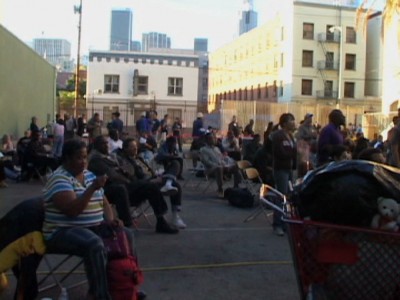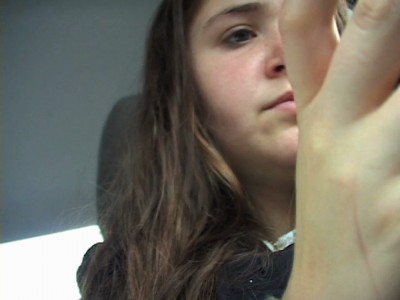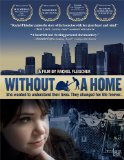| Reviews & Columns |
|
Reviews DVD TV on DVD Blu-ray 4K UHD International DVDs In Theaters Reviews by Studio Video Games Features Collector Series DVDs Easter Egg Database Interviews DVD Talk Radio Feature Articles Columns Anime Talk DVD Savant Horror DVDs The M.O.D. Squad Art House HD Talk Silent DVD
|
DVD Talk Forum |
|
|
| Resources |
|
DVD Price Search Customer Service #'s RCE Info Links |
|
Columns
|
|
|
Without A Home

Filmmaker Rachel Fleischer is, for better or worse, the perfect stand-in for all those of us leftward-leaning, reasonably comfortable/privileged urbanites who cannot make a foray downtown or to any busy district without being directly confronted with homelessness, a visible and shameful social problem that brings on a sense of simultaneous concern, helplessness, and (what conservatives and Ayn Rand-venerating types seem to find so endlessly laughable) guilt and personal culpability. Without A Home, Fleischer's film on the homelessness she witnesses in and around Los Angeles, is humble and confused, as she is ready to admit she is herself, and that is both its essential, rough beauty and its primary (though not insurmountable) flaw.
The film opens on Fleischer driving around the truly bleak, real-life-dystopian streets of Los Angeles's skid row, admitting that she's just looking for homeless people to document because ever since she was a little girl from a solid middle-class background, she has been drawn, for reasons she says she does not really know or understand, to the homeless. Out of multiple encounters during this search, Fleischer narrows her documentation down to four or five principal "stories" that we follow over the course of the film: that of Mike, a resident of and volunteer worker at L.A.'s Midnight Mission homeless/rehab shelter; that of Gilbert, a seemingly hopeless skid row resident whom Mike has taken under his wing; that of Tina, a debilitatingly mentally handicapped woman who hangs around outside a Von's supermarket in Pasadena while she waits the inexcusably long wait for Section Eight housing to come through; that of Tracy, a 46-year-old man who lives, with his wife and several children, hand to mouth in unsanitary flophouse conditions as he searches desperately for some work or a helping hand; and that of Aric, an eccentric, banjo-playing busker who has been pursuing his musical ambitions on the streets of Hollywood for 25 years while living in his car.

Fleischer begins by telling these individuals' stories from a vérité approach with her home-movie, plucky-amateur video camera technology and shooting style, but Without A Home quickly evolves into a sort of personal diary in which she herself becomes implicated in her subjects' lives and fates. Her brave personal investment, her unfailing respect for the dignity of all the people she comes across regardless of how severely antisocial or fallen-down they might be, and her willingness to take a cold, hard look at herself (at one moment looking into her camera after a Kafka-esque ordeal checking Mike out of a public/county hospital and confessing, "I've never been to a county hospital before.... I've gone to Cedars-Sinai and UCLA...I'm spoiled.") go quite a long way toward compensating for the film's too-frequent detours into voice-over homilies/platitudes ("Our power as human beings is the ability to effect change...the most amazing things can happen.") and sappy music-driven montage moments.

Without A Home's coexisting naiveté and brutal honesty make for a strange, sometimes jarringly incongruous mix and an alternately truly compelling and fairly tedious viewing experience, yet it is difficult to imagine Fleischer's dedicated, (over)earnest project turning out any other way. She sticks with her subjects unfailingly, never judging even as, like the tragic Mike, they backslide and seem to self-destruct, undoing all their encouraging good efforts and progress. And she places herself into uncomfortable positions that provoke real thought while putting her at risk of appearing overly wide-eyed, in over her head, or even hypocritical. (Where does one create a boundary line between oneself and the homeless people who trust you and are allowing you to film their lives? When they hit you up for a $50 loan? When they ask to stay at your place? When they fall off the wagon and send you inappropriately flirtatious text messages, as Mike does to Fleischer?) Without A Home is a movie about a big, intimidating social problem, but at its best it stays on the personal and intimate-scale interpersonal levels, effectively conveying the awkwardness and the necessity of approaching homeless persons as whole, complete, distinctly individual human beings rather than faceless components of an abstract issue. It is very roughly made, and it's not always successful, but it is nevertheless captivating and well worth a look; the way Fleischer guilelessly puts herself out there, both in the film and with the film, convinces you that this is what a straightforwardly generous, unassumingly compassionate, flawed-but-trying heart looks and sounds like when it's worn on the sleeve.

EXTRAS:
Extras include a bounty of additional footage, both incidental encounters with the "minor" characters in the film (those homeless whose stories are not followed for as long or as in-depth) and extended interviews with some of the main subjects, the most involved being an hour-long sit-down with Mike in which he discusses, with heartbreaking frankness and in harrowing detail, the history of abuse and degradation that brought him to the point of being a homeless drug addict. Additionally, there are deleted scenes depicting Fleischer's discomfort and even fright when faced with the not-very-pretty and sometimes actually dangerous behaviors of often mentally ill and/or intoxicated people whose survival instincts have understandably been brought to the fore. Finally, the disc includes the film's trailer, a "making of" for its title song (written and performed by Fleischer's sister Jessica) and trailers for other documentaries released by Breaking Glass Pictures, Without A Home's distributor.
FINAL THOUGHTS:A movie cannot fix a social problem, but Without A Home is not nearly presumptuous or arrogant enough to esteem its own power or importance that highly. Instead, when it's at its best it is an investigation into and revelation of the discomfort, helplessness, ineptitude, and even shame felt by those of us who--like director Rachel Fleischer--care and want to help, but cannot really relate to the hardships or experiences of the homeless and need to work on cutting through our paralysis and preconceived notions to get at the real humanity--the individuality, uniqueness, and value--of each homeless person's story. The film is flawed, but perhaps aptly so; like the as-yet unaccomplished goals of those who, like Fleischer and her target audience, are invested in a civilized, humane society, it is something of an unfinished, floundering, yet absolutely essential, sometimes even encouraging and hopeful, work in progress. Recommended.
|
| Popular Reviews |
| Sponsored Links |
|
|
| Sponsored Links |
|
|
| Release List | Reviews | Shop | Newsletter | Forum | DVD Giveaways | Blu-Ray | Advertise |
|
Copyright 2024 DVDTalk.com All Rights Reserved. Legal Info, Privacy Policy, Terms of Use,
Manage Preferences,
Your Privacy Choices | |||||||












